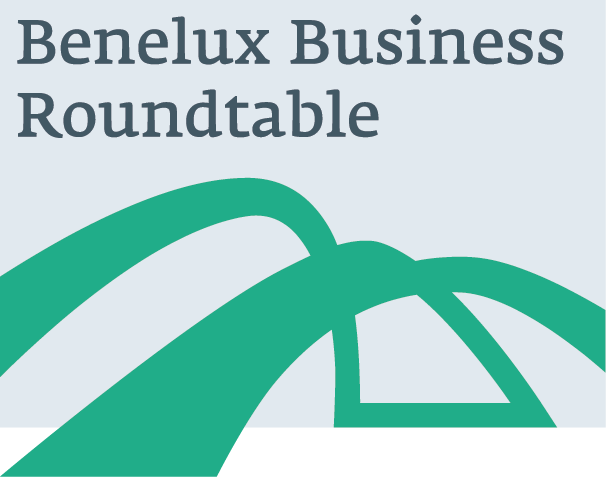About us
Our purpose
Everything we do at the Benelux Business Roundtable (BBR) serves one purpose: consolidate and strengthen the role that Benelux industry can play in Europe and the world.
Our principles guide our ambitions:
- Flanking the Benelux region as the cradle of European integration, at smaller scale but faster and deeper than the EU;
- Facilitating cross-border collaboration and strategy on key themes;
To achieve this, we provide a platform for industry players to meet and develop common positions on topics of shared interest.


Our vision
The Benelux is uniquely positioned to lead the transition, just as it once laid the foundations of the European Union. Business leaders in key markets need to embrace their responsibilities and take the lead in promoting this process.
Our members share the belief that accelerating cross-border collaboration is essential to securing sustainable growth and long-term prosperity in one of Europe’s most dynamic regions. This ambition goes beyond Benelux itself, as the region should act as a catalyst for broader European progress.
The Benelux partnership offers a unique advantage. The region is one of Europe’s most prosperous areas, home to key industrial clusters and major ports that drive high-value production and trade. Its strong ties with Germany, France, the UK, and the Nordic countries significantly contribute to boost employment and welfare in the region.
Rooted in shared geography, history, culture and economic structure and formalised through the Benelux Treaty, this collaboration enables Belgium, the Netherlands and Luxembourg to pilot many ambitions of the European project on a smaller scale, but with greater speed and agility.
By harmonising regulations, unlocking economies of scale, removing unnecessary barriers, and defining a bold strategic position within Europe, the Benelux has the potential to lead by example. It can demonstrate how deeper integration – when aligned with tangible benefits for citizens and businesses – can overcome national reticence and move the European vision forward.
Why the Benelux?
“…Benelux integration inspired the architects of European integration.”

A proud history and unique assets
The Benelux is the perfect testing ground for cross-border integration in the EU and can be an accelerator for competitiveness for the entire content.
The Benelux can offer member countries and citizens the possibility to scale up and increase business opportunities through an integrated economic union with specific focus on competitiveness, energy and circularity.
Benelux cooperation inspired the architects of European integration. This is why the EU and Benelux treaties grant the Benelux Union the competence to pursue faster and deeper integration than mandated by the EU treaties. (art 350 EU Treaty and art 6 Benelux Treaty).
The EU is shaping a new wave of industrial policy, building on the foundations of the Green Deal. However, implementation is key. Member States need to remove barriers and foster truly integrated markets to deliver real impact. The Benelux now can play a leading role in advancing the EU’s agenda.
The fourth economic power in the EU, with a critical gateway-to-Europe function, world class industries and marine expertise, highly skilled workforce and top-notch knowledge-centres.
Looking back
It was here, in the spirit of unity and progress, that Belgium, the Netherlands and Luxembourg first demonstrated the power of economic cooperation, paving the way for the European Coal and Steel Community in 1951, the seed from which the EU would grow. By breaking down barriers and fostering collaboration, the Benelux became the blueprint for European integration, setting the standard for bold, forward-thinking leadership.
After Germany, France, and Italy, the Benelux region is now the fourth-largest economic power in the EU-27, boasting an income per capita among the highest globally. It ranks among the top five in international trade, is home to world-leading universities and research centres, and hosts the European headquarters of numerous multinational companies.
With a highly skilled workforce, its geographical position and world-class infrastructure, the Benelux stands as the natural gateway to Europe.
These achievements are the result of decades of deepening international cooperation within the Benelux and the European Union since World War II. The region has long served as a model for European integration, inspiring the very architects of the EU. This foundational role is formally recognised in Article 350 of the EU Treaty and Article 6 of the Benelux Treaty, granting the Benelux Union the legal competence to pursue faster and deeper integration than what is currently mandated at the EU level.
Looking now
Yet today, that collaborative momentum is under pressure.
Geopolitical tensions, such as the Russian invasion of Ukraine and increased protectionism, have created a more unstable global economy. As a result, Europe’s competitiveness is under pressure. Large industrial players are leaving the continent. Smaller, open economies like those of the Benelux depend heavily on exports and seamless cross-border alignment; they have been and, without decisive action, will continue to be disproportionately affected by these developments
Added pressures, such as internal tensions among EU Member States and increased regulatory burdens for European industry have only amplified the need for bold, coordinated action. The European Commission is working on a Clean Industrial Deal to help provide solutions, but Member States need to act, too. For the Benelux to remain an important voice within Europe and the world, revitalised collaboration is essential.
Looking forward
A shared vision, anchored in a common approach to cross-border challenges will allow member countries to scale solutions, unlock new business opportunities, and deliver tangible benefits for citizens. By advancing shared priorities through a common strategic vision, the Benelux can reaffirm its role, not only as a regional leader, but as an accelerator of Europe’s future.
The Benelux can now play a leading role in advancing the EU’s agenda.
Board members
Eric ter Hark
Executive Chairman of the Board
Jan Remeysen
CEO BASF Antwerp
Marinus Tabak
COO RWE Generation
Cedric de Vicq
CEO Lhoist Europe
Carlo Thelen
Managing director Chamber of Commerce Luxemburg
